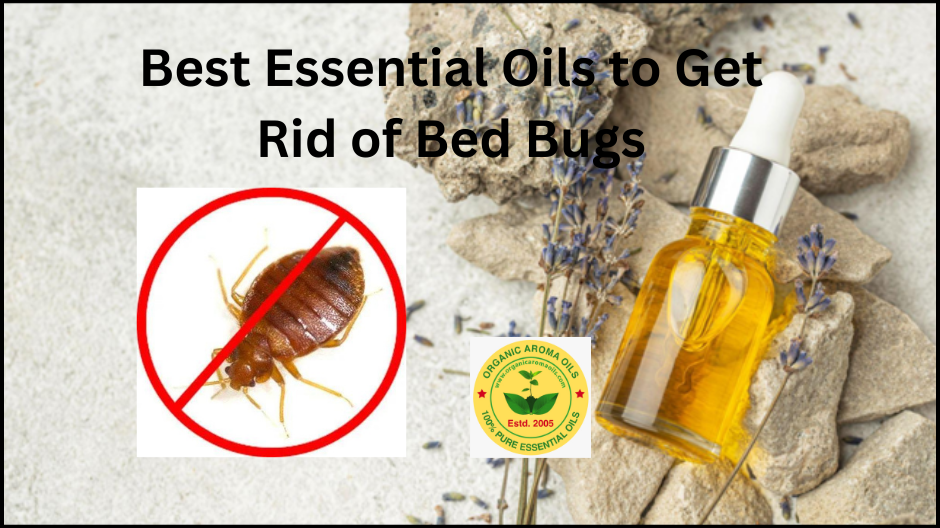Do Essential Oils Repel or Kill Bedbugs?
Bedbugs, those pesky nocturnal pests, can quickly turn a peaceful night's sleep into a nightmare of itchy bites and sleepless nights. While there are various methods for dealing with bedbug infestations, many people are turning to natural remedies like essential oils. But do essential oils really repel or kill bedbugs?
Let's delve into the effectiveness of essential oils in combating these unwelcome intruders.
Understanding Essential Oils:
Essential oils are concentrated liquids extracted from plants, each possessing unique properties and scents. Many essential oils are renowned for their insect-repelling qualities and have been used for centuries as natural alternatives to chemical insecticides.
Essential Oils Commonly Associated with BedBug Control:
Several essential oils are believed to have repellent or insecticidal effects on bedbugs. Among the most commonly cited are:
- Lavender Oil: Known for its calming fragrance, lavender oil is often touted as a natural insect repellent, including against bedbugs.
- Tea Tree Oil: With its powerful antimicrobial properties, tea tree oil is believed to have insecticidal effects on bedbugs, potentially disrupting their nervous systems.
- Peppermint Oil: The strong scent of peppermint oil is thought to deter bedbugs and other pests, making it a popular choice for natural pest control.
- Eucalyptus Oil: Eucalyptus oil contains compounds like cineole, which may have insect-repelling properties that could discourage bedbug activity.
Repellent vs. Insecticidal Effects:
When it comes to using essential oils to repel bedbugs, it's important to distinguish between repellent and insecticidal effects.
Repellent: Some essential oils may deter bedbugs from approaching treated areas or discourage them from staying in infested areas. However, repellent effects may vary depending on factors such as concentration, formulation, and individual bedbug sensitivity.
Insecticidal: Certain essential oils are believed to have insecticidal properties that can kill bedbugs upon contact or ingestion. These oils may disrupt bedbug physiology or interfere with vital functions, leading to their demise.
Effectiveness and Considerations:
While anecdotal evidence and some studies suggest that certain essential oils may have some efficacy against bedbugs, it's essential to approach their use with caution and realistic expectations.
- Variable Results: The effectiveness of essential oils for bedbugs can vary depending on factors such as concentration, application method, environmental conditions, and the extent of infestation.
- Not a Standalone Solution: Essential oils should not be considered a standalone solution for severe bedbug infestations. Integrated pest management approaches, including professional extermination methods, may be necessary for effective control.
- Safety Considerations: Some essential oils can be irritating to the skin or respiratory system, particularly when used in high concentrations or improperly. Always follow safety guidelines and dilution recommendations when using essential oils for pest control.
Practical Tips for Using Essential Oils
- Dilution and Application:
Always dilute essential oils with a carrier oil or water before application to avoid skin irritation or other adverse reactions.
- Follow recommended dilution ratios provided by reputable sources or manufacturers. A typical dilution ratio is 2-5% essential oil to carrier oil or water.
- Use a spray bottle or dropper to apply diluted essential oil solutions to targeted areas where bedbugs are suspected to be hiding, such as mattress seams, cracks and crevices, and baseboards.
- Targeted Treatment:
- Focus on treating areas where bedbugs are likely to congregate or travel, such as around the bed frame, headboard, and nightstands.
- Pay special attention to seams, folds, and other crevices where bedbugs may hide during the day and emerge at night to feed.
- Consistent Application:
- Apply essential oil solutions regularly, as bedbug control requires consistent effort to disrupt their life cycle and eliminate infestations.
- Reapply essential oils every few days or as needed, especially after cleaning or vacuuming treated areas, to maintain their potency.
- Multiple Oils and Blends:
- Experiment with different essential oils or blends to find combinations that work best for repelling or killing bedbugs.
- Consider mixing multiple oils known for their insect-repelling or insecticidal properties, such as lavender, tea tree, peppermint, and eucalyptus oils, to create a potent deterrent.
- Steam Treatment:
- Combine the use of essential oils with steam treatment to effectively kill bedbugs and their eggs.
- Use a steam cleaner with a nozzle attachment to deliver high-temperature steam to infested areas, including mattresses, furniture, and carpets, to penetrate deep into hiding spots and eradicate bedbugs.
- Laundering and Fabric Treatment:
- Add a few drops of essential oils to the laundry detergent when washing bedding, linens, and clothing to repel bedbugs and discourage their presence.
- Alternatively, create a homemade fabric spray by diluting essential oils with water and lightly misting over upholstered furniture, curtains, and other fabrics to deter bedbugs.
- Prevention and Maintenance:
- Incorporate essential oils into a proactive approach to bedbug prevention by regularly treating potential entry points and harborage areas.
- Use essential oil-based repellents or sprays to create a barrier around beds, luggage, and other areas susceptible to bedbug infestation when traveling or staying in hotels.
- Monitor and Evaluate:
- Continuously monitor treated areas for signs of bedbug activity, such as live bugs, shed skins, or dark spots indicating fecal matter.
- Evaluate the effectiveness of essential oil treatments over time and adjust your approach as needed based on observed results and feedback from pest control professionals.
By following these practical tips for using essential oils, you can enhance the effectiveness of your bedbug control efforts and create a safer and more pleasant living environment.
Essential oils offer a natural and holistic approach to combating bedbug infestations, providing homeowners with effective and environmentally friendly alternatives to traditional chemical insecticides. With their diverse array of aromatic compounds and insecticidal properties, essential oils serve as versatile tools in the fight against bedbugs, offering targeted treatment options, consistent application methods, and proactive prevention measures.
While they may not provide instant results, the use of essential oils aligns with the growing trend towards sustainable and eco-friendly pest management practices, prioritizing safety and sustainability. By harnessing the power of nature, homeowners can reclaim their living spaces from bedbug infestations while promoting a healthier indoor environment for themselves and their families. Embracing essential oils empowers individuals to take control of their homes and embrace a natural, safer approach to pest control.




